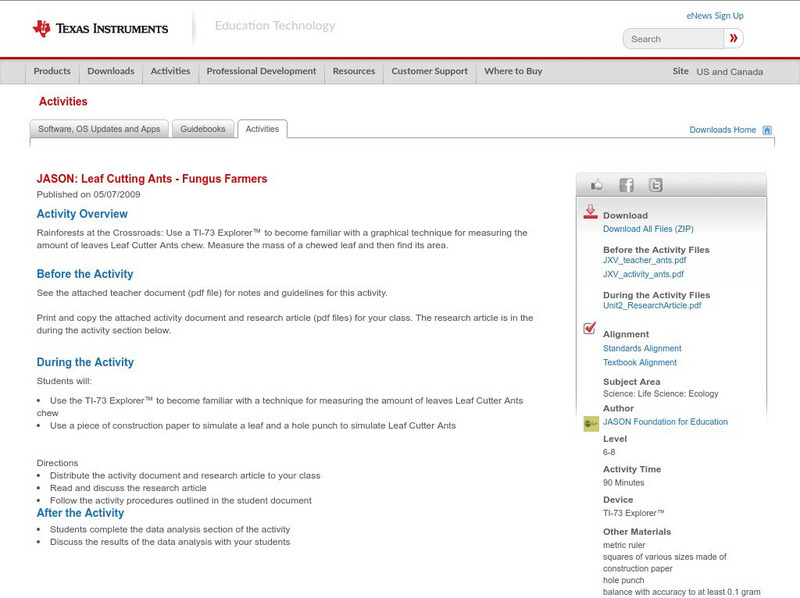Curated OER
Obtaining Food -- The Impact of Over-fishing
Students play a fishing game. In this food supply lesson students regulate their fishing in a game about over-fishing. The students identify resources that could be extracted from that biome.
Curated OER
Microbes and Health
Sixth graders investigate microorganisms. In this Science lesson plan, 6th graders examine how microorganisms can be both positive and negative. Students list diseases caused by microorganisms.
Curated OER
Earth's Recyclers
Students work together in groups to report on different topics related to decomposition. They answer questions and share their answers with the class. They discuss any topic that is unclear.
Curated OER
MAPPING A RESEARCH SITE AND COLLECTING AND PRESENTING POPULATION DATA
Sixth graders are to answer research questions based on data they collect.
Curated OER
I Depend on You, You Depend on Me!
Young scholars explore the interdependency between humans and the ecosystems. They examine how uncontrolled development threatens the rain forests. They discuss how human actions affect the rain forest.
Curated OER
Transmission of Disease
Students provide names of viral diseases that they would possibly like to be infected with today; listing them on the Smart Board. They then come to an agreement about what virus to use and use beakers of fluids to simulate how viruses...
Curated OER
Make Sense of Nature
Students participate in this program that heightens their awareness and curiosity of nature as well as their sense of adventure and exploring new surroundings. They identify and choose an object from nature after exploring it with other...
Curated OER
Light My Fire ...Fly
Students examine fire flies. They measure the frequency of light stimulus used by communicating fire flies. Students explore the concept of organisms using light to communicate. Students film the fire flies and quantify the duration...
Curated OER
Meet the Arctic Benthos
Pupils recognize and identify major groups found in the Arctic benthos. They describe common feeding strategies used by benthic animals in the Arctic Ocean. They discuss relationships between
Curated OER
Let's Get to the Bottom of the Arctic!
Students identify the three realms of the Arctic Ocean, and describe the relationships between these realms. They describe different species associations in a benthic community.
Curated OER
PLANTING A TREE
Students study how to select the right tree for the right site, how to properly plant a tree, and how to mulch and water a tree.
Curated OER
MANAGING THE SCHOOL FOREST
Students study how to plant a seedling, how to mulch the trees into the nursery bed, transplant seedlings to another site or school, and determine why we need to water and mulch trees.
Curated OER
This Place is Going to the Dogs
Students study different breeds of dogs. They watch a video, "Extraordinary Dogs", about special dogs and how they are categorized according to their adaptations. Then they create a digital video that demonstrates the qualities of dogs...
Curated OER
DNA Extraction From a Variety of Tissue Samples
Young scholars, working in cooperative groups, extract very impure samples of DNA from a number of tissue samples. They determine how the samples can be preserved and how they are similar.
Curated OER
Earthworms
Fifth graders research the earthworm and write a one paragraph report on its anatomy and habitat. They learn about worms and how to dissect them through Video Streaming and virtual dissections, along with actually dissect a worm as...
Curated OER
Animal Kingdom: Phylum Chordata
Students use a dichotomous key to classify various vertebrate jar speciments into classes. They examine the speciments for general characteristics of each class and fill in a corresponding chart and then complete a few final assessment...
Georgia Department of Education
Ga Virtual Learning: Biology: Protists and Fungi
A multi-media learning modlue immersing students in the kingdoms of fungi and protists. Activities include informational text, video clips, animations, and student assignments.
University of Missouri
Microbes in Action: Classroom Activities: A Swell Lab: Yeast Fermentation [Pdf]
This two-day experiment uses different concentrations of sugar to study the rate of fermentation. Students observe the rate of carbon dioxide gas produced by yeast to infer the rate of fermentation. Lesson plan gives a lab procedure,...
University of Missouri
Umsl: Microbes in Action: Classroom Activities: Fungus I [Pdf]
A science experiment to observe the rate of carbon dioxide gas produced by yeast. Students will get a visual of the process of fermentation. Lesson plan gives a lab procedure, teacher instructions, points for discussion, and additional...
University of Missouri
Microbes in Action: Classroom Activities: Growth of Fungi on Plates [Pdf]
A science experiment to observe the growth of a colony of yeast cells. Students should also be able to observe the hyphae and mycelia structures. Lesson plan gives a background, lab procedure, teacher instructions, points for discussion,...
Australian National Botanic Gardens
Australian Government: Spore Release and Dispersal
The differences between active and passive spore release in fungi are explained in this thorough site.
Texas Instruments
Texas Instruments: Jason: Leaf Cutting Ants Fungus Farmers
Rainforests at the Crossroads: Use a TI-73 Explorer to become familiar with a graphical technique for measuring the amount of leaves Leaf Cutter Ants chew. Measure the mass of a chewed leaf and then find its area.
Other
Math and Science Activity Center: Classification of Living Things
Kingdom is the highest rank used in the biological taxonomy of all organisms. There are 6 kingdoms in taxonomy. Every living thing comes under one of these 6 kingdoms. The six kingdoms are Eubacteria, Archae, Protista, Fungi, Plantae,...
Other
Mdc: Edible and Poisonous Mushrooms
This site gives three different illustrations of edible wild mushrooms. Along with each illustration is a brief description of the mushroom, including where and when it can be found, cautions you should be aware of, and cooking tips for...

















![Microbes in Action: Classroom Activities: A Swell Lab: Yeast Fermentation [Pdf] Activity Microbes in Action: Classroom Activities: A Swell Lab: Yeast Fermentation [Pdf] Activity](https://static.lp.lexp.cloud/images/attachment_defaults/resource/large/FPO-knovation.png)

